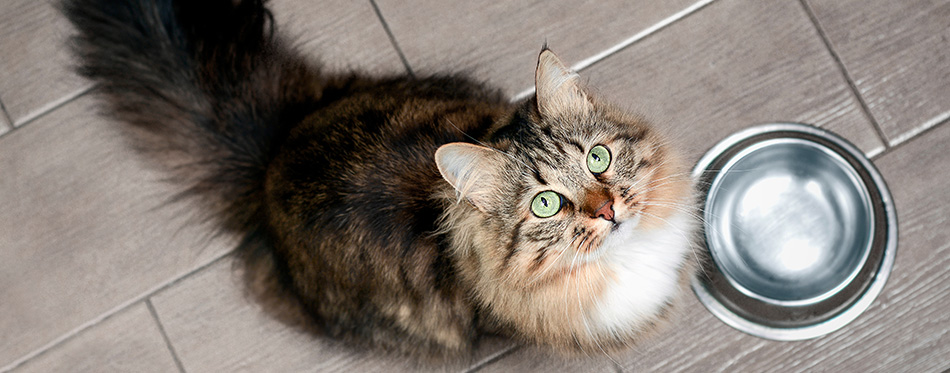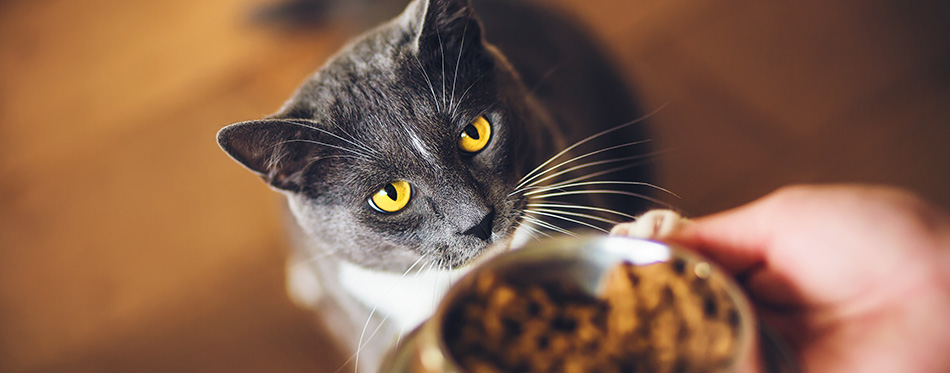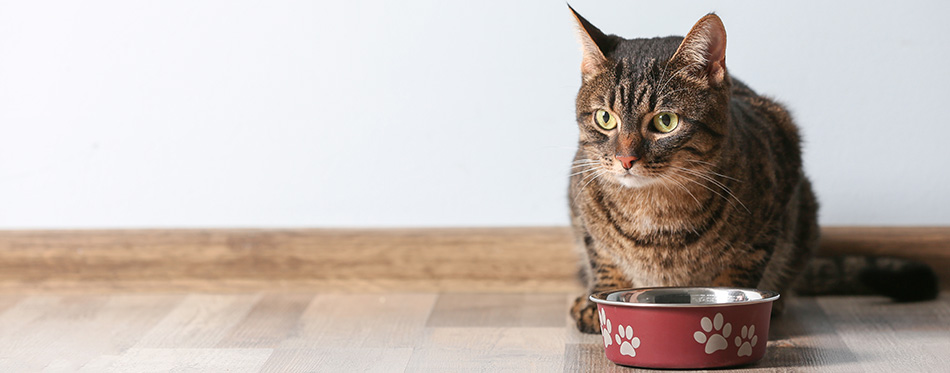It’s no secret that our pernickety pussycats can pull a face when it comes to eating food. Oftentimes, your pet may have happily been enjoying their food for weeks, before suddenly turning their nose up and deciding not to eat their food anymore, for seemingly no rhyme or reason. But when does a cat not eating become a more serious problem? How long can a cat not eat and at what point does it become dangerous for your cat to go without food? Discover the answers to all this, and much more, in our article below.
When To Go The Vets Because The Cat Is Not Eating
The first thing you should know when it comes to cats’ eating habits is that, if anything changes suddenly and if you’re worried about your pet, then there’s no harm in making an appointment with your vet. You know your cats best, and any good vet would always prefer that you ask for a check-up than come in with an emergency because you didn’t want to bother them, initially.
However, some of the more extreme symptoms which can be major signs of underlying conditions with your cat’s body include:
- Vomiting
- Diarrhea
- Straining but not being able to poop
- Any difficulty breathing
- Lethargy
These are warning signs that there is an underlying condition that needs to be dealt with, as soon as possible – and also surefire signs that your pet has more than an upset tummy, without having to check the food bowl.

Reasons Why Cats Stop Eating
There are many reasons why your cat might go without eating for a few days, and it could simply be that they’re sourcing their meals from elsewhere or something equally reasonable. However, if you’ve noticed other changes in your cat – and have kept them in for a few days to be sure that they’re not being fed by a friendly neighbor or similar – but notice that they still aren’t eating, it could be due to one of the following reasons.
Dental Issues
One of the first things to check for, when your pet loses their appetite, is to check their teeth and gums. Cats have a habit of fighting with other cats, hunting small animals, and generally getting up to mischief when out and about. For the most part, this is just part and parcel of the relaxed life of a kitty. However, one of the major side effects of this is they’re prone to damaging their claws and teeth during their shenanigans.
If your cat seems fine in themselves, but appears to have lost their appetite, it can be worth checking their gums for any broken teeth or inflammation in the gums. Sometimes, this can go away on its own, but it’s always worth checking with a vet to see if any antibiotics or anti-inflammatories are required to help the healing process.
Digestive Problems
If your kitty has eaten something a little funny, or are avoiding their food and water but have diarrhea and/or vomiting, this is usually a sign of some digestive upset. This can occur from something fairly straight-forward, such as a change in their diet – for example, from dry cat food to wet cat food without any transition process – and may go away within a few days. However, if your cat stops eating and has excessive diarrhea, vomiting, or is struggling to pass stools, this can be a sign of a blockage or a long-term problem. Make an appointment at your local veterinarian and be sure to let them know all of the symptoms.
Stress
Like anything else in life, sometimes things can just get a little stressful. If you’ve had a big change, such a new family member (in the form of a pet or a human!), moved house or gotten a new job, this can create a major change in your furry friend’s life that can be extremely stressful for them. The good news is that there are many ways you can help them to readjust, and even supplements such as CBD treats you can give to help lower their stress levels and prevent illness.
Find out more about Cat Treats here.
Medicines
Some medicines will have some side effects ranging from nausea to tummy upsets, which can cause your cat to go off their food or water. While this generally is only a short-term problem as their body acclimates to their medication and their appetite returns, it’s always worth keeping an eye on how long your cat food remains untouched. In particular, if your cat hasn’t drunk any water within 24 hours of taking new medication, or coming round from surgery, give your local practice a call and ask for further advice.
Kidney Failure
One of the biggest problems relating to cats who aren’t eating is organ damage – and one of the first organs to be hit is the kidneys. If you’ve noticed that you can’t get your cat to eat but they’re drinking excessive amount of water, this can be a sign that the kidneys are failing and requires an immediate trip to the animal hospital or local vet, as soon as possible.
Head over to our review of Cat Food for Kidney Disease for more alternatives.

Signs and Symptoms That A Cat Isn’t Eating
Sometimes it’s never as simple as noticing that a cat doesn’t eat for so long – especially if your pet is an outdoor kitty. In these cases, it’s worth looking at other signs and symptoms that your cat may stop eating or be struggling with their appetite. Where possible, it can be worth forcing your cat to stay indoors for a few days, to see whether they’re at least drinking water or trying to get your cat to eat. However, this isn’t always possible, and sometimes you’ll need to let your cat go outside due to being feral, for example, so do be sure to look out for:
- Weight loss: Of course, one of the biggest signs is weight loss, which can happen suddenly or over time. In this case, it’s always worth calling up the veterinarian to rule out anything sinister.
- No interest in wet food or tuna water: These are some of the most appealing snacks for cats, and so for a cat to go without eating and to turn down these tasty treats is a big warning sign.
- Sunken eyes: This is a major sign of dehydration and should be treated as an emergency, as the next step is usually major organ damage.
- Lethargy: Another big behavioral sign is a change in activity. If your cats suddenly become lethargic, it could be that their lack of protein or water has led to an emergency and requires a trip to the local animal hospital.
What Happens If A Cat Refuses To Eat Their Food?
The biggest and most pressing problem when it comes to cats refusing to eat food, is that there is a high chance of problems occurring within the organs, in a very short amount of time. Earlier, we mentioned a couple of different issues within the organs that can cause a decreased appetite. However, while a cat can survive without food for a short amount of time, going without food or having a decrease appetite for two weeks without any other reason becoming apparent can lead to further complications, including hepatic lipidosis.
Also referred to as fatty liver disease or fatty live syndrome, hepatic lipidosis is a very common health problem in cats and is unique to our feline friends – particularly indoor cats. It will be one of the first things your vet will test for, via a liver biopsy – especially if your cat is generally overweight or has a stocky build. It occurs when the liver works overtime to meet up with the demands of breaking down fat in the body, following a period of short-term anorexia in your cat (where the cat goes without food for 2 or 3 days). Because the supply of the fatty deposits is greater than the liver’s ability to process it, the deposits begin to store themselves within the liver cells – causing hepatic lipidosis.
While the survival rate of this illness is good once caught, it requires a fast-acting owner and knowledgeable vet in order to catch the disease in time. This is why it’s so essential to keep an eye on how much food your cats may or may not be eating, and keeping an eye on the water bowl, too.
Take a look at our reviews of Cat Food for Indoor Cats and Cat Food for Weight Loss for more info.
What To Try For A Cat That Refuses To Eat
If you’ve ruled out anything sinister, or aren’t sure if your cat isn’t having any food or water just yet, try these tricks to see if you can entice your cats to eat.
Change Food
While it may seem obvious, the sad truth is that sometimes cats will just go off their food because they’re seeking a little variety. If you use canned food, then be sure that you’re choosing a cat food that has a level of protein that is suitable for your cats’ needs. For dried food, you’ll need to make sure there’s easy access to plenty of water alongside their meals.
Change Location
Some cats may go off their food due to it being in an awkward location, such as being too close to their litter tray. In these cases, a simple change in where you place their food can encourage your cat to eat.
Try Supplements
For an upset stomach or a cat with changing dietary needs, trying supplements can sometimes make a big difference, and bring back your cats’ appetite.
Visit The Local Veterinarian
While these are all simple – yet tried and tested – methods to get your cat to eat it’s worth noting that, if none of these work, do get in contact with your cats’ vet to make an appointment and have everything checked out.

How Long Can A Cat Live Without Food?
For those wondering “how long can cats go without food?”, rest assured that it is more likely your cat has an upset tummy than anything serious. However, a cat can only survive without water for roughly two days. Without protein, but with water, the survival rate can be anywhere between two weeks and four days. As such, it’s important to get your cat checked out as soon as possible if you’re concerned.

